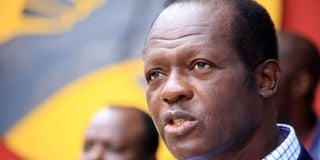Premium
Jubilee disunity: No easy days for Uhuru

Jubilee Party Secretary-General Raphael Tuju addresses the press outside Jubilee House in Pangani, Nairobi County, on October 2, 2020.
President Uhuru Kenyatta will this year need all the political genius he can muster to put together the party that propelled him to his second term.
The survival of Jubilee Party is threatened by the falling-out between allies of the President and his deputy, Dr William Ruto. At the centre of the issues that could see Jubilee disintegrate are feelings among Dr Ruto’s allies that they have been edged out of decision-making in the party.
When it was cobbled together by merging 12 political parties in 2016, Jubilee was promoted as a new dawn for Kenya’s political parties. It was meant to be a “tribeless” party where all communities would feel represented. All was well until it won power in 2017, then a fall-out ensued when, in March 2018, party leader President Kenyatta made a pact with opposition leader Raila Odinga in what birthed the Building Bridges Initiative (BBI).
Historically, two years before elections sees bold political moves being made by the big players, and 2020 saw the two Jubilee leaders design their political journeys independent of each other.
The party postponed its much-anticipated elections, reduced the deputy party leader to a bystander on internal affairs, and changed its leadership in parliament in a controversial manner. There are signs are that the party could further disintegrate this year as Dr Ruto goes for the top seat next year.
What happened
The genesis of Jubilee’s meltdown was accusations by Mr Kenyatta’s loyalists that the DP was using his allies to disrespect and sabotage the President.
The party would have consolidated its hold on power and faced the coming political tests of a referendum and the General Election but failure to hold party elections exposed it to mutual suspicions.
Nairobi Senator Johnson Sakaja believes that the far-reaching changes in the National Assembly and Senate were necessary as the President “asserted himself.” In mid-December Jubilee lost by-elections in Gaturi and Lakeview wards in Murang’a and Nakuru counties but survived in Kahawa Wendani, Kiambu County.
The wins in the December by-elections helped build momentum for the new kid on the block, UDA, ahead of the upcoming mini polls. There is no definite date for party elections and, unless Registrar of Political Parties Anne Nderitu cracks the whip, it is unlikely that party elections will take place, and this could allow the current leaders to hold office for the foreseeable future.
The party remains divided along Tangatanga (pro-Ruto) and Kieleweke (pro-Kenyatta) lines and it is a question of when not if one side will leave.
Jubilee Deputy Secretary General Caleb Kositany says the party surrendered its win to its 2017 rival, ODM, much to the chagrin of its members.
“We now have to kowtow to ODM yet we beat them at the main polls. This has never happened anywhere in the world where the ruling party plays second fiddle to the opposition,” he said.
"Fatigue"
Mr Kositany, a close ally of the deputy president, says the way the house leadership was changed is testament to fact that there is no internal democracy within the ruling party.
“We even postponed party elections, which should not have been the case. Now the economy is crumbling and doctors are on strike. These are things the party would be addressing but now it has been hijacked. I don’t see the party ending well,” he said ominously.
He predicts Jubilee will soon break apart because of “fatigue”.
“I don’t see much happening in Jubilee, the future is bleak and by June 2021 the party will be no more,” he says. He adds that Jubilee risks going the Kanu way which had over 150 MPs during 1990s and now has less than 10 MPs.
Nominated MP Maina Kamanda, who is a staunch Ruto critic, insists that the party is in capable hands.
“We have had a robust year. All rebels were kicked out. The party has delivered on its legislative agenda and members have been properly whipped. The party has been in safe hands of Secretary General Rapahel Tuju and deputy chairman David Murathe,” he said. Mr Kamanda added that the party will grow stronger by entering into partnerships with other like mined parties.
A good 2020
Mr Sakaja, who served as the chairman of the defunct TNA on whose platform President Kenyatta was elected in 2013, says 2020 was good for the party.
“There were leaders who would question the President’s policies publicly and he had to assert himself and get rid of them. The President put his foot down. He showed all that he was very much in charge,” he said.
Mr Adan Keynan, Secretary of the Jubilee Coalition Parliamentary Group, said the party has been strong during 2020 and predicted that it would grow even stronger in 2021.
“We have been steadfast in our support for the President’s agenda. In 2021, Jubilee will put measures so that it is strong, robust and people-centred from the villages, sub locations to counties and at the national level,” he said.
The jury is still out whether the party will approach 2022 elections as united as it was in 2017, but what’s for sure is that decision will be clearer to Kenyans in the course of 2021.





